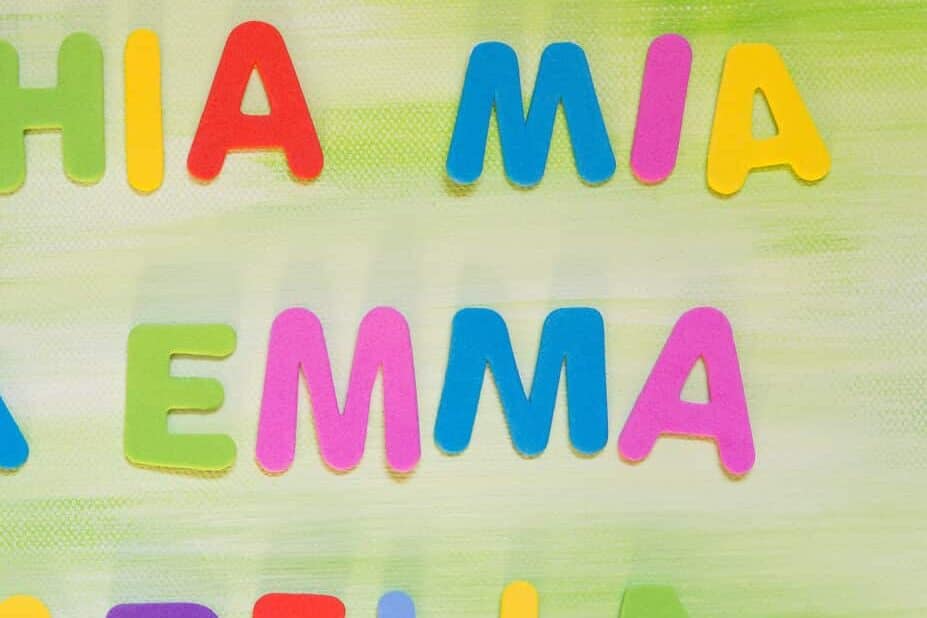Phoenix’s top baby names for 2023 line up with some of the most popular names around the U.S. Naming a child is an important step in preparing for your newest family members, and it’s good to look at the most popular names to think about what kind of name might work for you. The popularity of certain names can have a lot to do with cycles. The Social Security Administration tracks “popular” names, “classic” names, and “comeback kid” names. The “popular” classification applies to names that peak repeatedly in a period of two years. “Classic names” can peak in the last 20 years, and “comeback kid” names have a rest period of 50 years between popularity peaks (via TIME Magazine).
According to AZ Central, some of Phoenix’s top baby names for 2023, have remained on this list for the last 4-10 years. “Olivia,” has stuck around for the past four years, while “Liam,” has been popular in the State of Arizona for a full decade now! Other names included on this list feature classics like “Isabella,” “Noah,” and “Emma.” Read on to learn about the meaning and origin behind Phoenix’s top baby names for 2023. We’ll discuss historical icons and literary characters with these names, popular cultural references, and more. Stick around as we get into some of the most popular baby names in Phoenix.
1. Olivia/Oliver
The names “Oliver” and “Olivia,” have quite a few origins and meanings. In the Old Norse language, it was a variation on the name “Álefir” which translates to “descendent of ancestors.” In French, the name is “Olivier,” which means olive tree, and in Latin “oliva” means olive. These language roots connect to the symbolism of an olive tree which means peace, unity, beauty, and fruitfulness. Oliver Twist is an iconic literary character with this name, and it shows up regularly in television and movies.
2. Isabella
Next up we have “Isabella” which has roots in Italian, and Spanish. It is actually a variation of the traditional name “Elizabeth.” In Hebrew, it translates to “God is my oath,” coming from the name “Elisheba.” It can also be interpreted as “pledged to God,” while the nickname “Isa,” translates to “salvation,” instead of “pledged.” Common variations of “Isabella,” include “Issy,” “Bella,” or “Belle.”
3. Liam
As mentioned above, the name “Liam” is one of the most popular names in Arizona, a spot it's held for quite a while. The name has roots in the Irish name “Uilliam,” and the German name “Wilhelm.” It has a few meanings, including “warrior,” and “strong-willed protector” (via Very Well Family).
4. Emma
The name “Emma,” comes from the Germanic word “Ermen,” meaning “whole,” or “universal.” This could be considered a “classic name.” And, it permeates quite a few popular culture examples. Ever read Jane Austen's Emma? There are also famous actresses Emma Stone, Emma Thompson, and Emma Watson.

©Miriam Doerr Martin Frommherz/Shutterstock.com
5. Mateo
“Mateo” comes from the Latin name “Matthew,” and the Hebrew variation “Mattiyahu.” It is popular as a name in parts of Greece, Spanish-speaking countries, and Italy. In all these iterations, the name translates to “gift of God.” Nicknames or variations include “Matthäus,” “Matthias,” and “Massey” (via Family Education).
6. Mia
The name “Mia” is a shortened version of the names “Maria,” and “Miryam.” With roots in Hebrew, Spanish, Italian, and even ancient Egyptian, the name translates to “beloved,” “mine,” and “sweet one,” in many different languages. It can sometimes be a nickname for longer names like “Amelia,” or “Michal.”
7. Noah
“Noah,” is derived from the Hebrew term “Noach,” meaning to “rest,” or take “repose.” There's also a Babylonian word “Nukhu,” with a similar meaning. The name is carried by Noah, from Noah's Ark in the Old Testament. The story of the godly man who built an ark to save the animals and his family instructs on the values of perseverance, loyalty, and hard work.
8. Camila
“Camila,” is a name with Latin, Italian, Spanish, and Portuguese roots. It means “religious attendant,” or “acolyte.” Variations on the spelling include “Camilla,” with two “l's” and nicknames might show up as “Mia,” or “Mila,” respectively. Famous Camilas include pop icon Camila Cabello and actresses Camila Mendes and Camila Morrone.
9. Santiago
“Santiago” is the Spanish iteration of “James.” It means “supplanter,” which can also mean “usurper.” There is a Patron Saint, one of Jesus's twelve apostles, called Saint Santiago.
10. Sophia
The name “Sophia,” is Greek in origin. Its meanings include “sophistication,” and “wisdom.” There were quite a few Royal family members with the name “Sophia” during the Middle Ages. Name and spelling variations include “Sofia,” “Sophie,” and “Sofi.” Other famous Sophias include actress Sophia Loren.
11. Elijah
The name “Elijah,” is Biblical in nature, and in Hebrew, it translates to “Jevoha is my God.” Featured in the Old Testament, Elijah the Prophet defended and encouraged worshippers of God. The feminized versions of the name include “Eliana,” and “Eliyah.” Famous Elijahs include actor Elijah Wood, and the musician Elijah Cummings (son of Cher!)
12. Amelia
“Amelia,” has roots in the Latin word “Amal,” meaning “industrious,” and “fertile.” Nicknames for “Amelia,” may include “Mia,” “Amy, “Lia,” and even “Emily.” Alternate spellings may include “Emilia.”
13. Sebastian
The name “Sebastian” comes from a Latin word used to describe individuals hailing from Sebaste, an ancient region in what now is considered Turkey. It means “venerable,” “revered,” and “respected.” Saint Sebastian in the Bible is the patron of athletes and martyrs alike. The French variation of the name is spelled with two “n's” and shows up as “Sébastienne.”
14. Charlotte
The name “Charlotte,” is a version of the name “Charles.” Both names come from the Old English word “ceorl,” which referred to free men who were neither royalty nor considered a slave.
15. Ezra
“Ezra” is a Biblical name meaning “helper” or “aid,” in Hebrew. The Hebrew word “Azar,” comes from the word “Azaryahu,” meaning “God helps.” Ezra from the Bible was a priest. He brought the Torah, the Hebrew Bible, to the Jewish people who escaped from Babylon. Famous Ezras include the actor Ezra Miller, and the political correspondent, Ezra Klein.
16. Evelyn
The name “Evelyn,” is derived from the French name “Avaline.” The meanings of this name are varied and include “life,” “desired,” and “island.” If you look at the parts of the name “Eve,” and “Lyn,” the meaning expands to “desired child,” “strength,” “island,” and “little bird.”

©New Africa/Shutterstock.com
17. Luna
“Luna,” is a name associated with the Goddess of the moon. It means moon in Spanish, Latin, and Italian. In Roman myths, the Moon Goodness is known as Diana, while in Greek mythology, she's known as Selena. She is a powerful figure, scattering starry arrows across the sky in her chariot.
18. Levi
“Levi,” comes from the Hebrew, meaning “united,” and “joined.” In The Old Testament's Book of Genesis, “Levi” is one of the sons of Jacob. Also the “Levites,” were an Israelite tribe.
19. Benjamin
Speaking of sons of Jacob, Benjamin was the youngest son of Jacob in the Bible. The name “Benjamin,” comes from the Old Testament, and means the “son of the right hand,” in Hebrew. To be the “Benjamin” of the family means you are the youngest. Nicknames for this particular name include “Ben,” and “Benji.”
20. Ezekiel
And lastly, at least for this list of Phoenix's top baby names of 2023, we have “Ezekiel.” This name comes from the Hebrew “Yechezqel” which translates to “God will strengthen.” In the Old Testament, Ezekiel is a prophet. He lived in Jerusalem before being taken to Babylon. The anglicized version of the name “Ezekiel,” has been popular since the 1500s (via Behind The Name).
The image featured at the top of this post is ©Dreamframer/Shutterstock.com.
